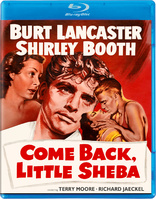Come Back, Little Sheba Blu-ray Movie
HomeCome Back, Little Sheba Blu-ray Movie 
Kino Lorber | 1952 | 99 min | Not rated | Jul 09, 2024Movie rating
7.1 | / 10 |
Blu-ray rating
| Users | 0.0 | |
| Reviewer | 4.0 | |
| Overall | 4.0 |
Overview
Come Back, Little Sheba (1952)
An emotionally remote recovering alcoholic and his dowdy, unambitious wife face a personal crisis when they take in an attractive lodger.
Starring: Burt Lancaster, Shirley Booth, Terry Moore (I), Richard Jaeckel, Philip OberDirector: Daniel Mann
| Drama | 100% |
Specifications
Video
Video codec: MPEG-4 AVC
Video resolution: 1080p
Aspect ratio: 1.37:1
Original aspect ratio: 1.37:1
Audio
English: DTS-HD Master Audio 2.0
Subtitles
English SDH
Discs
Blu-ray Disc
Single disc (1 BD)
Playback
Region A (locked)
Review
Rating summary
| Movie | 4.0 | |
| Video | 4.0 | |
| Audio | 5.0 | |
| Extras | 2.0 | |
| Overall | 4.0 |
Come Back, Little Sheba Blu-ray Movie Review
Reviewed by Dr. Svet Atanasov July 15, 2024Daniel Mann's "Come Back, Little Sheba" (1952) arrives on Blu-ray courtesy of Kino Lorber. The supplemental features on the release include audio commentary recorded by critic Scott Harrison and vintage trailer. In English, with optional English SDH subtitles for the main feature. Region-A "locked".
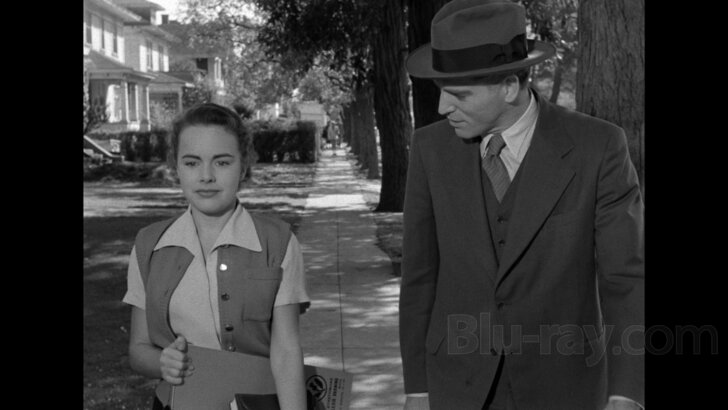
Something is not quite right about their kindness, the love they give each other. From time to time, when they talk, it looks like they are trying to protect something very brittle, something precious that is at the center of their relationship and makes it work. Both seem aware of their important efforts, but are unwilling to acknowledge them.
It is soon after college student Marie (Terry Moore) rents a room in their house that the nature of their relationship becomes clearer. Doc (Burt Lancaster), who is in his late forties, is a former alcoholic and has managed to revive his chiropractic practice. Lola (Shirley Booth), who is in his early forties and married to him, is enormously proud of his transformation and determined to preserve it. Even though they do not have kids, they want their relationship to have a proper public image, in the neighborhood and at the AA meetings Doc has been attending for a little over a year now. According to Doc and Lola, maintaining this image is winning half the battle against alcoholism.
But convincingly winning the other half has proved to be a remarkably exhausting task, which is why Doc and Lola have been secretly spending a lot of time thinking about their past. What would their relationship look like had Lola not lost their baby? Did Doc marry Lola only because she had become pregnant? What would have happened if she did not get pregnant? Would they have parted ways had Doc not managed to defeat his addiction? And how much stronger would their relationship be if their beloved dog, Little Sheba, had not run away?
Unaware of the delicate nature of Doc and Lola’s relationship, Marie brings home Turk (Richard Jaeckel), an overconfident, often even inappropriately aggressive ‘friend’ who is filing the void of her future fiancée. When Doc recognizes in Turk a familiar version of the young man he was before he became involved with Lola, he unexpectedly snaps and over the course of a single night destroys the progress he has made after walking away from alcohol. However, despite shattering Lola’s trust in him and embarrassing himself before his colleagues, Doc makes an important discovery that allows him to see and reevaluate his existence in an entirely new way.
Daniel Mann’s cinematic adaptation of William Inge’s popular play is a multi-layered drama that has not aged particularly well, but right now this might be the most compelling reason to seek and see it again. Here’s why:
Lancaster’s transformation is enormously impressive and most likely impossible to replicate by a contemporary actor. Indeed, in the early 1950s, Lancaster was more than a decade younger than the alcoholic he was cast to play, but in the film, he actually looks a decade older than the alcoholic. Contrary to what you would read in old reviews, it is not the makeup that makes the difference. It is what Lancaster does to appear miserable and brittle, how he speaks to reveal internal pain that is impossible to capture with a camera.
There is something else that Lancaster does extremely well, but is rarely highlighted when the film is deconstructed. Lancaster not only strengthens but effectively legitimizes Booth’s character arc, which is quite uneven. It is very interesting to observe how he does it because for much of the film the two are drifting away from each and their relationship is collapsing. It is often Lancaster’s ‘simple’ facial expressions that do the hard work because they tune up Booth’s otherwise overly melodramatic performance and oddly enough some of the very best emerge when she is not around him.
The most unconvincing material is with Moore and Jaeckel. When the two engage each other, but also when the former is around Lancaster and Booth, it becomes impossible to ignore the presence of Mann’s rolling camera.
Come Back, Little Sheba Blu-ray Movie, Video Quality 
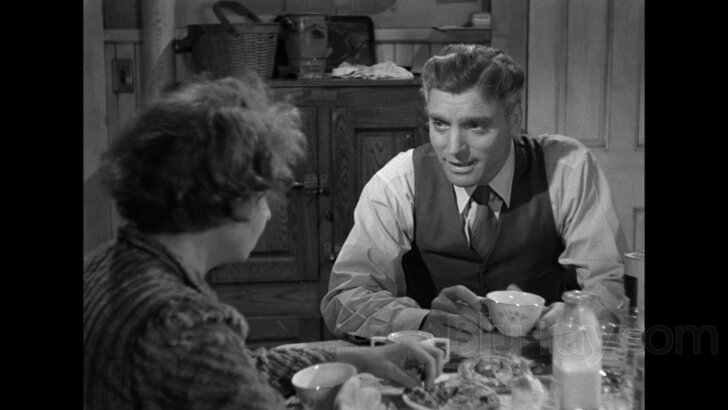
Presented in an aspect ratio of 1.37:1, encoded with MPEG-4 AVC and granted a 1080p transfer, Come Back, Little Sheba arrives on Blu-ray courtesy of Kino Lorber.
A couple of years ago, we reviewed this Australian release of Come Back, Little Sheba from local label Imprint Films. The release introduced a 4K restoration of the film. Kino Lorber's release is sourced from the same 4K master. However, these release do not offer identical presentations of the film.
While very similar, this release produces marginally brighter visuals. The discrepancy is meaningless because it is so small that it does not impact the overall quality of the visuals. The same can be said about the other presentation of the film -- all darker and brighter visuals look practically identical. Delineation, clarity, and depth range from very good to excellent, possibly even outstanding. Minor fluctuations can be observed, but they are not introduced by digital corrections. Grain exposure is good. However, I previously speculated that a future, different 4K restoration can produce some minor improvements, and I have not changed my mind. Also, this future 4K restoration can eliminate various minor imperfections that are retained on the current master. Fluidity is fine, though this is another area where minor improvements can be made. All in all, this release offers a strong organic presentation of Come Back, Little Sheba, but there is room for some minor yet meaningful improvements. My score is 4.25/5.00. (Note: This is a Region-A "locked" Blu-ray release. Therefore, you must have a native Region-A or Region-Free player in order to access its content).
Come Back, Little Sheba Blu-ray Movie, Audio Quality 
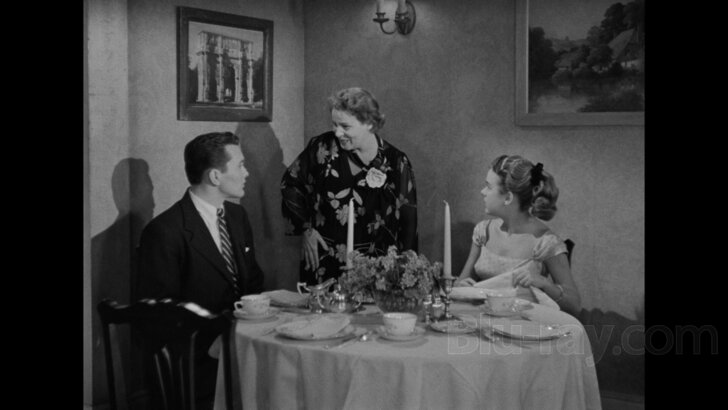
There is only one standard audio track on this Bu-ray release: English DTS-HD Master Audio 2.0. Optional English SDH subtitles are provided for the main feature.
Franz Waxman's score has an important role in Come Back, Little Sheba. However, it would be a stretch to claim that the music is part of memorable scenes where dynamic intensity is excellent. Come Back, Little Sheba has a sound design with obvious limitations of the kind that many films that were produced during the 1950s have. The dialog is very clear, sharp, clean, and easy to follow. While revising the film, I did not encounter any encoding anomalies to report in our review.
Come Back, Little Sheba Blu-ray Movie, Special Features and Extras 
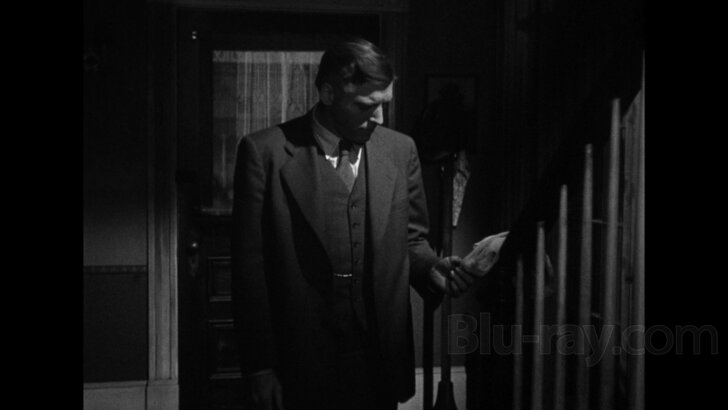
- Trailer - presented here is a remastered U.S. trailer for Come Back, Little Sheba. In English, not subtitled. (3 min).
- Commentary - this audio commentary was recorded by critic Scott Harrison. It initially appeared on Australian label Imprint Films' Blu-ray release of Come Back, Little Sheba.
Come Back, Little Sheba Blu-ray Movie, Overall Score and Recommendation 
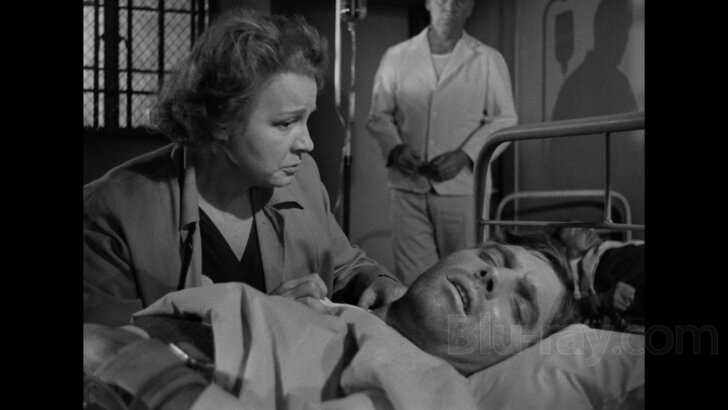
Everything that works very well in Come Back, Little Sheba is because of Burt Lancaster's tremendous transformation, including Shirley Booth's Oscar-winning performance. Interestingly, Lancaster was more than a decade younger than the alcoholic he was cast to play, but in the film, he often looks a decade older than the alcoholic. Kino Lorber's release is sourced from a recent solid organic 4K master supplied by Paramount Pictures. HIGHLY RECOMMENDED.
Similar titles
Similar titles you might also like

Picnic
Limited Edition to 3000 - SOLD OUT
1955

Marjorie Morningstar
1958

Clean and Sober
Warner Archive Collection
1988

Hilda Crane
Limited Edition to 3000
1956

The Rose Tattoo
1955

A Summer Place
Warner Archive Collection
1959

Educating Rita
1983

From the Terrace
Limited Edition to 3000
1960

Diner
1982

Very Good Girls
2013

Hobson's Choice
1954

Cat on a Hot Tin Roof
Warner Archive Collection
1958

Christopher Strong
Warner Archive Collection
1933

The Kids Are All Right
2010

God's Own Country
2017

The Way We Were 4K
50th Anniversary
1973

No Down Payment
Limited Edition to 3000
1957

Fifty Shades of Grey
Unrated Edition
2015

Bus Stop
Fox Studio Classics
1956

Written on the Wind
1956
